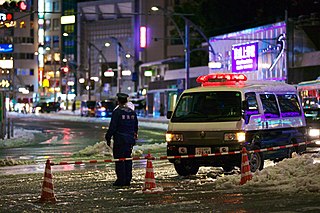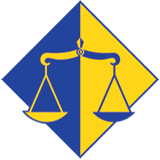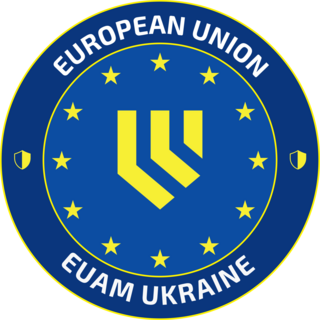Related Research Articles

Law enforcement in Japan is provided mainly by prefectural police under the oversight of the National Police Agency. The National Police Agency is administered by the National Public Safety Commission, ensuring that Japan's police are an apolitical body and free of direct central government executive control. They are checked by an independent judiciary and monitored by a free and active press.

The Consolidation of the Justice System in Albania (EURALIUS) was an EU funded technical assistance project that sought the strengthening of the Albanian Justice System. The objective of EURALIUS was to strengthen the independence, transparency, efficiency, accountability and public trust in the Albanian justice system in line with the EU Acquis and best practices. EURALIUS was composed of long-term international experts from various EU Member States and of Albanian legal professionals who act as national experts, as well as support staff consisting of project assistants, translators, etc.

The High Judicial and Prosecutorial Council of Bosnia and Herzegovina is the national council of the judiciary of Bosnia and Herzegovina. It is the self-regulatory body of the judiciary in the country, tasked with guaranteeing its independence, with countrywide competences over the administration and career management of judicial office holders. It is based on the continental tradition of self-management of the judiciary.
Recent decades have seen a surge in the birth of "supraterritorial institutions and associations", that have been gathered by their enactment of common law and practices. European Union's regional expansion into Southeastern Europe to include Romania is one such example. The community of European states has enacted treaties that have allowed them to unite politically and economically.

The European Union Rule of Law Mission in Kosovo, known as EULEX Kosovo or simply as EULEX, is the largest civilian mission ever launched under the Common Security and Defence Policy (CSDP) of the European Union. EULEX supports selected Kosovo rule of law institutions on their path towards increased effectiveness, sustainability, multi-ethnicity and accountability, free from political interference and in full compliance with international human rights standards and best European practices.

The Ministry of Women, Family and Community Development, abbreviated KPWKM, is a ministry of the Government of Malaysia responsible for social welfare: children, women, family, community, older people, destitute, homeless, disaster victim, disabled. The ministry determines the policies and direction to achieve the goals of gender equality, family development and a caring society in line with Malaysia's commitment towards the United Nations' Convention on the Elimination of All Forms of Discrimination Against Women and the Beijing Declaration.

The area of freedom, security and justice (AFSJ) of the European Union (EU) is a policy domain concerning home affairs and migration, justice as well as fundamental rights, developed to address the challenges posed to internal security by collateral effects of the free movement of people and goods in the absence of border controls or customs inspection throughout the Schengen Area, as well as to safeguard adherence to the common European values through ensuring that the fundamental rights of people are respected across the EU.

The Ministry of Justice of Azerbaijan is a governmental agency within the Cabinet of Azerbaijan in charge of regulation of the justice system, overseeing the public prosecutor, maintaining the legal system and public order and instituting law reforms.
Humanitarian Law Center (HLC) is the Serbian non-governmental organisation with offices in Belgrade, Serbia, and Pristina, Kosovo. It was founded in 1992 by Nataša Kandić to document human rights violations across the former Yugoslavia in armed conflicts in Croatia, Bosnia and Herzegovina, and, later, Kosovo.
Victims' rights are legal rights afforded to victims of crime. These may include the right to restitution, the right to a victims' advocate, the right not to be excluded from criminal justice proceedings, and the right to speak at criminal justice proceedings.

The Ministry of Justice is one of the 12 ministries which comprise the Finnish Government. Headed by the Minister of Justice, it is responsible for maintaining the legal safeguards necessary for the successful operation of democracy and fundamental rights of the inhabitants of Finland.

The Office of the Prosecutor General of Moldova is a government institution in Moldova, that works within the judicial power. It carries out and promotes observance of the rule of law, justice, protection of the rights and legitimate interests of the individual and society in criminal and other legal proceedings.

The Ministry of Justice of the Russian Federation is a ministry of the Government of Russia responsible for the legal system and penal system.

The Kosovo Judicial Council (KJC) is the national council of the judiciary of Kosovo. It is the oversight body that aims to ensure the independence and impartiality of the judicial system, and the administration of justice in Kosovo.

Kosovo has a civil law system which is also sometimes known as the Continental European law system. The central source of law that is recognized as authoritative is codifications in a constitution or statute passed by legislature, to amend a code. This system of Kosovo has experienced several changes throughout the years and is currently a system that includes prominent bodies and branches that help Kosovo enact adequate laws and conduct proper legal procedures.
The Ministry of Justice of the Republic of Uzbekistan,, is the central government body charged consistent implementation of a single state policy in the sphere of lawmaking and law enforcement practice in Uzbekistan.
The Judiciary of Kosovo is the collection of the central Kosovo institutions that exercises judicial authority in Kosovo. According to the 2008 Constitution of Kosovo, the judicial system is composed of the Supreme Court and subordinate courts, a Constitutional Court, and an independent prosecutorial institution. The courts are administered by the Kosovo Judicial Council.
The Ministry of Justice and Human Rights of Angola is judiciary arm of government that specializes on human rights in the nation of Angola.

The Prosecution Ministry is a constitutional body integrated into the Judiciary of Spain, but with full autonomy. It is entrusted with defending the rule of law, the rights of the citizens, and public interest, as well as watching over the independence of the courts of justice.

European Union Advisory Mission Ukraine is a civilian Common Security & Defence Policy (CSDP) mission of the European Union. It aims to assist Ukrainian authorities to reform civilian security sector. It provides strategic advice and practical support to make Ukrainian civilian security sector more effective, efficient, transparent and enjoying public trust. EUAM Ukraine works with a number of law enforcement and rule of law institutions of Ukraine, and it formally began operation on 1 December 2014, following Ukrainian Government's request.
References
- ↑ "RE-ESTABLISHMENT AND REFORM OF THE JUSTICE SYSTEM IN KOSOVO 1999 – 2011 A CONTEXT ANALYSIS" (PDF). May 2011.
- ↑ "UNMIK establishes two new PISG ministries and the Kosovo Judicial Council". ReliefWeb. Retrieved 2018-07-15.
- ↑ "Uskoro nova kosovska ministarstva". B92.net (in Serbian). Retrieved 2018-07-16.
- 1 2 3 4 "Chiefs of State and Cabinet Members of Foreign Governments". www.cia.gov. Archived from the original on October 4, 2013. Retrieved 2018-07-15.
